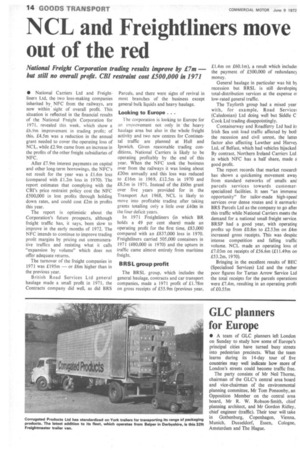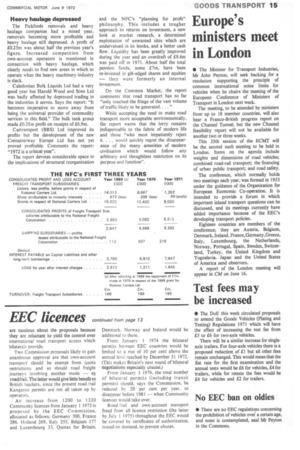NCL and Freightliners move out of the red
Page 16

Page 17

If you've noticed an error in this article please click here to report it so we can fix it.
National Freight Corporation trading results improve by £7m — but still no overall profit. CBI restraint cost £500,000 in 1971
• National Carriers Ltd and Freightliners Ltd, the two loss-making companies inherited by NFC from the railways, are now within sight of overall profit. This situation is reflected in the financial results of the National Freight Corporation for 1971, revealed this week, which show a £6.9m improvement in trading profit; of this, £4.5m was a reduction in the annual grant needed to cover the operating loss of NCL, while £2.9m came from an increase in the profits of the other freight subsidiaries of NFC.
After £7.9m interest payments on capital and other long-term borrowings, the NFC's net result for the year was a £1.6m loss (compared with £1.2m loss in 1970). The report estimates that complying with the CBI's price restraint policy cost the NFC £500,000 in lost profits through holding down rates, and could cost £2m in profits this year.
The report is optimistic about the Corporation's future prospects, although freight traffic has, it says, been slow to improve in the early months of 1972. The NFC intends to continue to improve trading profit margins by pricing out unremunerative traffics and resisting what it calls "expansion by volume" which does not offer adequate returns.
The turnover of the freight companies in 1971 was £195m — or £6m higher than in the previous year.
British Road Services Ltd general haulage made a small profit in 1971, the Contracts company did well, as did BRS Parcels, and there were signs of revival in most branches of the business except general bulk liquids and heavy haulage.
Looking to Europe ...
The corporation is looking to Europe for an improvement not only in the heavy haulage area but also in the whole freight activity and two new centres for Continental traffic are planned at Hull and Ipswich. Given reasonable trading conditions, National Carriers is likely to be operating profitably by the end of this year. When the NFC took the business over from the railways it was losing about £20m annually and this loss was reduced to £16m in 1969, £12.5m in 1970 and £8.5m in 1971. Instead of the £60m grant over five years provided for in the Transport Act 1968, NCL is likely to move into profitable trading after taking grants totalling only a little over £40m in the four deficit years.
In 1971 Freightliners (in which BR holds a 49 per cent share) made an operating profit for the first time, £83,000 compared with an £837,000 loss in 1970. Freightliners carried 505,000 containers in 1971 (480,000 in 1970) and the upturn in traffic came almost entirely from maritime freight.
BRSL group profit
The BRSL group, which includes the general haulage, contracts and car transport companies, made a 1971 profit of £1.78m on gross receipts of £55.9m (previous year, £1.4m on £60.1m), a result which include; the payment of £500,000 of redundancy money.
General haulage in particular was hit by recession but BRSL is still developing total-distribution services at the expense 01 low-rated general traffic.
The Tayforth group had a mixed year with, for example, Road •Service; (Caledonian) Ltd doing well but Siddle C Cook Ltd trading disappointingly.
Containerway and Roadferry Ltd had it Irish Sea unit load traffic affected by both the recession and civil unrest, the lattei factor also affecting Lawther and Harvey Ltd, of Belfast, which had vehicles hijacked By contrast, Northern Ireland Carriers Ltd in which NFC has a half share, made e good profit.
The report records that market research has shown a quickening movement away from standard networks of smalls and parcels services towards customer specialized facilities. It sees "an immense opportunity" for tailor-made high-speed services over dense routes and it earmarks BRS Parcels Ltd as the company to go aftet this traffic while National Carriers meets the demand for a national small freight service. BRSP had a good year, with operating profits up from £0.8m to £2.53m on £4m increased gross receipts. This was despite intense competition and falling traffic volume. NCL made an operating loss al £7.03m on receipts of £56.6m (£11.49m on £53.2m, /970).
Bringing in the excellent results of EEC (Specialised Services) Ltd and the rather poor figures for Tartan Arrow Service Ltd the total receipts for the parcels operations were £7.4m, resulting in an operating profit of £0.55m
Heavy haulage depressed
The Pickfords removals and heavy haulage companies had a mixed year, removals becoming more profitable and heavy haulage still depressed. A profit of £0.25m was about half the previous year's figure. Increased competition from own-account operators is mentioned in connection with heavy haulage, which clearly needs to find new areas in which to operate when the heavy machinery industry is slack.
Caledonian Bulk Liquids Ltd had a very good year but Harold Wood and Sons Ltd was badly affected by depressed trading in the industries it serves. Says the report: "It becomes imperative to move away from being the universal provider of commodity services in this field." The bulk tank group made £0.35m profit on receipts of £6.9m.
Cartransport (BRS) Ltd improved its profits but the development of the new Containerway Europe Ltd has not yet proved profitable. Comments the report: "1972 is a critical year".
The report devotes considerable space to the implications of structural reorganization and the NFC's "planning for profit" philosophy. This includes a tougher -approach to returns on investment, a new look at market research, a determined exploitation of unwanted sites which are undervalued in its books, and a better cash flow. Liquidity has been greatly improved during the year and an overdraft of £9.4m was paid MT in 1971. About half the total pension funds, some £7m, have been re-invested in gilt-edged shares and equities — they were formerly an internal investment.
On the Common Market, the report comments that road transport has so far "only touched the fringe of the vast volume of traffic likely to be generated.... "
While accepting the need to make road transport more acceptable environmentally, the report warns that the lorry remains indispensable to the fabric of modern life and those "who most impatiently reject it . . . would quickly regret the disappearance of the many amenities of modern civilisation which would follow any arbitrary and thoughtless restriction on its purpose and function".




































































































